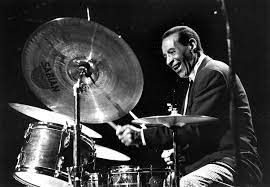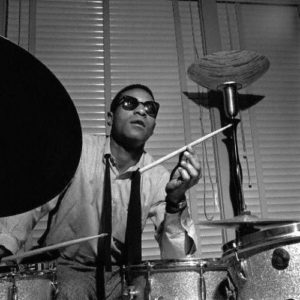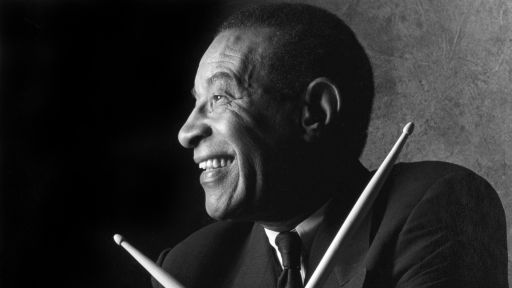News
Max Roach, One of the Most Important Drummers in History?!
Who is Max Roach?
Max Roach, born Maxwell Lemuel Roach on January 10, 1924, in Newland, North Carolina, was an influential American trailblazing jazz drummer, composer, and band leader. He became one of the most innovative and prolific drummers in the history of jazz. He (along with Kenny Clarke) played a crucial role in the development of bebop, a complex and fast-paced style of jazz that emerged in the 1940s. His impact on the world of jazz is immeasurable, and his creative approach to drumming has left an enduring legacy. For more than 50 years, he was kept at the vanguard of jazz because of his strong intellect, rhythmic innovations and even biting on political commentary.
Young Roach
Roach’s childhood was marked by both challenges and opportunities. His family moved to Brooklyn, New York when he was four years old. Growing up during the Great Depression, Roach faced financial hardships. However, his mother recognized his musical talent early on and saved money to buy him a drum set. This instrument became Roach’s gateway to a lifetime of artistic expression. He started drumming at the age of ten in a gospel ensemble where his mother was a gospel singer.
Influences played a crucial role in shaping Roach’s musical development. He drew inspiration from drummers like Baby Dodds, Chick Webb (whom he sees as a tremendous soloist), and Sid Catlett. But according to one of his interviews, it was Jo Jones whom he listened to over and over again after he heard him playing broken rhythms. Roach’s early exposure to big band jazz, particularly the orchestras of Duke Ellington and Count Basie, also left a profound impact on him. As a teenager, Roach attended the Manhattan School of Music, where he honed his skills and gained a deeper understanding of music theory.
Career
Max Roach’s professional career took off in the 1940s when he became part of the vibrant jazz scene in New York City. He played with some of the biggest names in the business, including Coleman Hawkins, Dizzy Gillespie, and Charlie Parker. His collaboration with Parker was particularly influential, as they formed a groundbreaking partnership that pushed the boundaries of jazz, giving birth to the bebop movement.
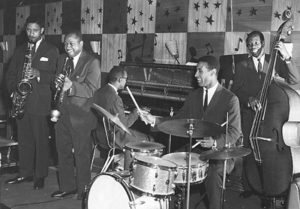
In 1954, Roach, together with trumpeter Clifford Brown, co-founded the Clifford Brown and Max Roach Quintet. This ensemble served as a breeding ground for emerging jazz talent and played a pivotal role in the development of hard bop. Unfortunately, the tragic death of Clifford Brown in a car accident in 1956 profoundly affected Roach. Despite this setback, he continued to lead the Quintet and remained at the forefront of jazz innovation.
As described by The New York Times, the Clifford Brown and Max Roach Quintet was “perhaps the definitive bop group until Mr. Brown’s fatal automobile accident in 1956″.
In 1970, he founded a percussion ensemble, M’Boom, with original members Roy Brooks, Warren Smith, Joe Chambers, Omar Clay, Ray Mantilla, Freddie Waits, and Roach.
Here’s an M’Boom performance from a Public Broadcasting Corp. show called ” Soul” in 1971
Style and Legacy
Roach’s drumming style was characterized by technical brilliance, rhythmic innovation, and a keen sense of musicality. He was a master of polyrhythms, incorporating intricate patterns and syncopations into his playing. His contributions went beyond mere drumming; he actively participated in the creative process, influencing the overall direction of the music.
As a bandleader, Roach continued to explore new musical territories. He embraced avant-garde and free jazz, collaborating with artists like Archie Shepp and Anthony Braxton. His willingness to push the boundaries of the genre showcased his versatility and fearlessness as an artist.
Max Roach’s legacy extends far beyond his drumming prowess. He played a crucial role in shaping the direction of jazz and influencing future generations of musicians. He was a socially conscious artist who used his music to address political and civil rights issues. In the 1960s, he composed and performed works like “Freedom Now Suite,” which addressed the struggle for racial equality. Roach was committed to using his platform to advocate for social justice, making him a pioneer in the fusion of music and activism.
Influence
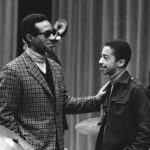
Max Roach’s influence on subsequent generations of drummers and musicians is immeasurable. His impact can be heard in the work of countless artists who followed in his footsteps, from drummers like Tony Williams to avant-garde pioneers like John Coltrane. Roach’s commitment to artistic exploration and social engagement set a standard for jazz musicians seeking to make a meaningful impact beyond the confines of the music itself.
The End of a Legend
Tragically, Max Roach passed away on August 16, 2007, at the age of 83. The cause of death was identified as complications from dementia. Roach’s death marked the end of an era in jazz, but his contributions and innovations continue to resonate in the hearts and minds of music enthusiasts worldwide. Max Roach’s life and career serve as a testament to the enduring power of artistic expression and its ability to transcend cultural and social boundaries.
His impact on the genre is still felt today, and he is remembered as one of the leading musicians, composers, bandleaders, and greatest drummers in the history of jazz since the 1940s.
Awards and Recognition
Max Roach received numerous awards for his contributions to jazz, including several Grammy Awards and a MacArthur Fellowship. In 1980, he was inducted into the DownBeat Hall of Fame, and at the Modern Drummer Hall of Fame in 1992.
Here’s a drum solo by Max Roach during Festival Jazz Lugano in 1990
And here’s another clip of Max Roach with Abbey Lincoln – Triptych (Prayer Protest Peace) 1964
Thank you once again for spending a few minutes of your precious time with me. Until my next article!

